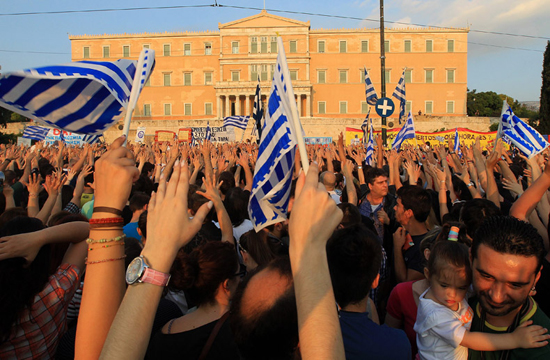The Sheep Look Up
Some will rob you with a six-gun
And some with a fountain pen.
Woody Guthrie, from Pretty Boy Floyd
I will not go into detail about the situation in Greece. The Guardian’s columnists have been covering it decently, given their distance from the source. Closer up so has The Press Project, whose documentary DebtOcracy puts the entire thing into perspective, showing up the contortions of the European Central Bank and the International Money Fund for what they are: attempts to safeguard large banks and their owners from any risks they incurred in the pursuit of exorbitant profits at the expense of societies and people.
I’m no blind patriot. I know what portion of this has come from bad internal policies and habits. Even so, I’m proud that my people are demonstrating non-stop, saying “Ohi!” (No) to the new occupiers-to-be just as they said it to the Italians and Germans when they demanded unconditional surrender. It is a source of great grief to me that my father, who was part of the resistance to the invaders and then helped rebuild the devastated country bit by hard-won bit as one of its most prominent engineers, will most likely leave life when his nation is at such a state.
I will leave you with a famous Cretan call to rebellion, sung by Nikos Ksilouris: “When will the skies clear, so we see the stars?” The people sang it before the Athens Parliament building. Because humans need bread and roses — and recognize slavery when they see it, no matter what those in power call it.
Images: Acropolis moonrise (Antónis Ayiomamítis); protests in Syntagma (Constitution) Square in front of the Parliament building, Athens, June 2011 (Oréstis Panayótou).




Nice to hear another example of Nikos Ksilouris singing.
Glad you enjoyed it, Francesca! There is a YouTube version of it with interspersed stills and short reels from the Resistance archives. I considered linking to it but decided that the images might be too strong for this post.
I know it doesn’t mean much from my comfortable sofa in Britain, but seeing the protests outside the Parliament building made me have a little more faith in humanity. The IMF and European banks have, as you say, stitched up the Grecian people like kippers and it’s so good to see them on the streets telling their supposed representatives where to stick it. Proof that prols worldwide aren’t just servile products for the rich and powerful to use and abuse.
Exactly. The other relevant points are that these demonstrations were spontaneous, peaceful (you can see a dad with his child in the right corner) and not associated with any political party. Furthermore, if the citizens of the rest of Europe think they will escape this fate, they’re sadly mistaken. My country is just the beginning of the return to feudalism in Europe.
Perhaps the one good thing to come out of this economic crisis is that it is forcing people to work together as a body to let their so-called leaders know they are not all puppets on strings. The Great Depression was a lot worse (and so far lasted much longer) and we survived that, though I don’t think a global war would do the trick this time around.
That photograph of the Moon rising over the Parthenon is not just beautiful, it is also symbolic: Like the Greek people, they have endured thousands of years of all kinds of abuse and still manage to stand and inspire – plus do that bit about forming Western Civilization as we know it.
Sadly, “spontaneous” means it’s a summer show that will go away. Not officially associated with any political party means that no one will take resopnsibility for actually doing anything and reserves the right to condemn the protestors whenever it becomes expedient to do so. Government policy is politics and not having a political program makes you politically irrelevant. As of now, Syntagma Square shows every sign of failing as abysmally as Tahrir Square. Indeed, Tahrir Square’s nonideological approach wasted lives and energy on a mere personnel change, but Syntagma Square doesn’t even have that much focus! Praising the self-defeating errors is perilously close to desiring defeat. I suppose the only sign of hope is the political extermination of DSK and his replacement by a woman.
Larry, I agree with you about both the picture and the people’s stance.
SJ, not quite. I’m not knowledgeable enough to comment on the situation in Egypt, though I thought it was ironic (and iconic) that they abused the women when they demonstrated for rights. Allying with the existing Greek political parties is a no-go at this point for many reasons that have already been widely discussed in the non-jerk media. I disagree that government policy is the only politics there is, although other kinds of representation have their own problems. Also the people at Syntagma Square do have a focus, no matter how articulate they are individually and collectively at expressing it: a government that abuses its own people (the honest ones disproportionately) in order to guarantee speculators’ usurious profits is not a government worth keeping.
Good to hear this beautiful, very apt song.
Terrible as the situation is, the image of the peaceful protesters standing up to their so-called representatives is truly inspiring.
May all be irrelevant. This is a pretty scary doomsday scenario.
http://www.dailykos.com/story/2009/7/27/758493/-The-End-of-the-Beginning-of-the-Collapse
Dear Heather, you probably recognize the voice (and what it represents in my fiction) from previous recordings we’ve shared in the past.
Brian, I think the list is quite realistic. The problem with humanity is that it still reacts by trying to find new, untrodden ground. That worked while we were few and the resources not only plenty but also immediately accessible. That is no longer the case, and it requires a radical retooling of our thinking process.